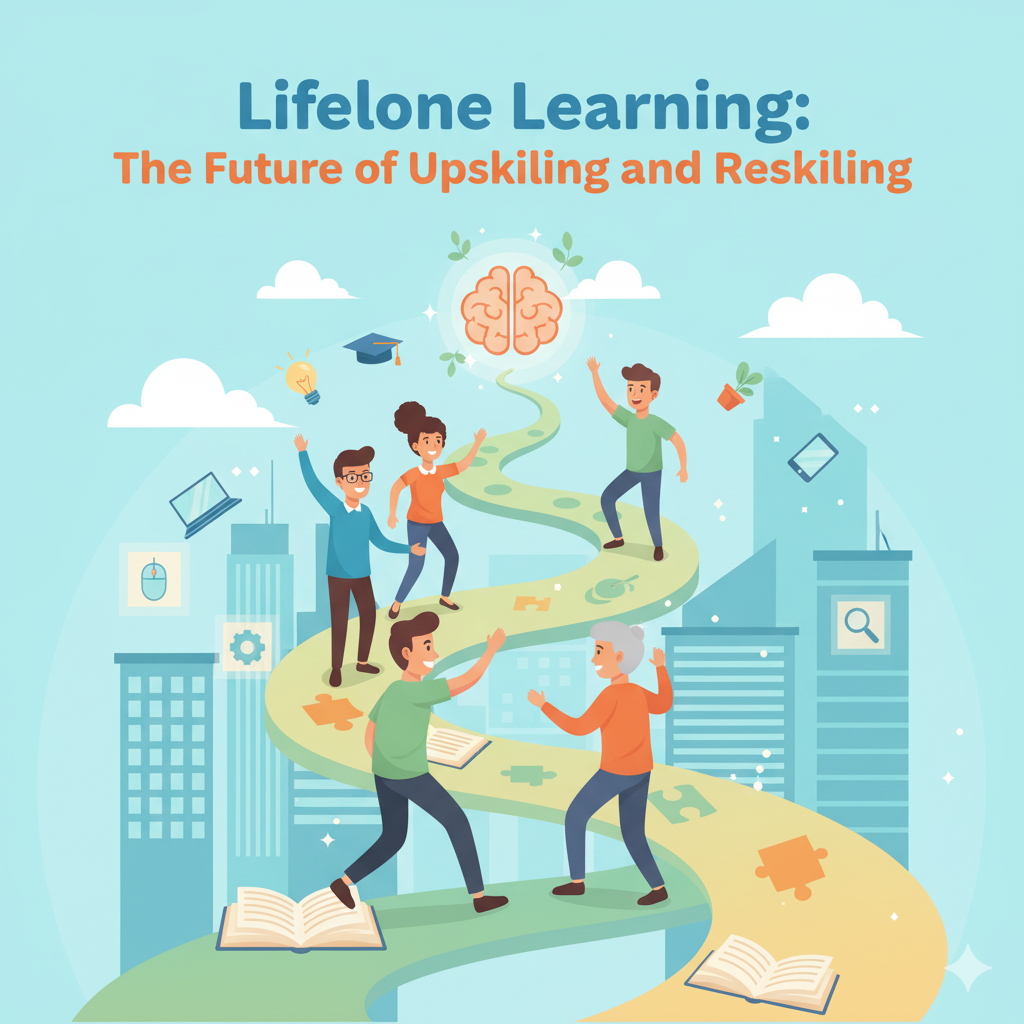In today’s rapidly evolving world, lifelong learning is no longer a luxury – it’s a necessity. With technology transforming industries, the demand for digital skills training, adaptability, and growth is higher than ever. Whether you’re a recent graduate, a mid-career professional, or someone seeking a career shift, investing in upskilling programs and reskilling programs can unlock countless opportunities.
This blog explores why lifelong learning matters, the role of e-learning platforms and online courses for upskilling, and how professional development courses UK and global initiatives are shaping the workforce of the future.
Why Lifelong Learning Matters More Than Ever
Traditional education once promised a stable career path. However, today’s world is far more dynamic. Automation, artificial intelligence, and global digitization are reshaping job roles at lightning speed. What you learned five years ago may already feel outdated.
That’s where lifelong learning courses step in. These programs empower individuals to:
1. Stay relevant in their industry.
2. Adapt to new technologies.
3. Explore cross-functional roles.
4. Strengthen employability across sectors.
Whether through formal skill development courses or informal learning opportunities, committing to continuous learning ensures you remain future-ready.
The Rise of Online Learning Platforms
Online learning platforms have revolutionized how we acquire new skills. They offer unprecedented flexibility, affordability, and access to world-class content. Leading e-learning platforms like Coursera, edX, and FutureLearn partner with top universities and companies to provide high-quality lifelong learning courses.
1.Coursera: Offers courses, specializations, and degrees from top institutions like Stanford and Yale.
2. edX: A non-profit platform founded by Harvard and MIT, providing a wide range of subjects.
3. FutureLearn: A UK-based platform offering courses from British and international universities.
These platforms are perfect for those seeking to earn certificates or micro-credentials that can be added to a professional resume or LinkedIn profile.
Upskilling vs Reskilling: Key Differences
Both upskilling programs and reskilling programs are vital to career growth, but they serve different purposes:
1. Upskilling:
a. Definition: Learning new competencies that enhance your current role. For example, a marketer may take online courses for upskilling in data analytics to interpret campaign results more effectively.
b.Concept: Enhancing current skills to perform a job better
c.Objective: Career advancement, efficiency, staying relevant
d.Example: A marketer learning advanced data analytics
2. Reskilling:
a.Definition: Acquiring a completely new set of skills to transition into a different career path. For instance, a retail employee might pursue digital skills training to move into IT support or software testing.
b.Concept: Learning entirely new skills for a different role
c.Objective: Transitioning to new career opportunities
d.Example: A factory worker retraining in cybersecurity
Professional Development Courses UK: A Global Benchmark
The UK has emerged as a global hub for professional development courses. Many institutions offer internationally recognized certifications that add value to your CV and enhance career prospects.
Professional development courses UK are particularly popular among international students and professionals because they:
1. Provide practical, industry-relevant knowledge.
2. Combine academic expertise with real-world applications.
3. Offer specialization in areas like project management, digital marketing, and data science.
Employers also respect these qualifications, making them a valuable investment for anyone pursuing lifelong learning.
Digital Skills Training: Crafting Your Personal Learning Strategy
Simply having access to courses isn't enough. A successful lifelong learner needs a strategic approach. Here’s how you can create your own personalized learning plan:
1. Assess Your Current Skills: Be honest about your strengths and weaknesses. What skills are in high demand in your industry? Where is the gap between your current abilities and future requirements?
2. Define Your Goals: Are you upskilling for a promotion, or are you reskilling for a new career? Set clear, measurable goals. This will help you choose the right upskilling programs or reskilling programs.
3. Choose the Right Format: Do you learn best through self-paced modules, live virtual classrooms, or hands-on projects? The right format will determine which online courses for upskilling are best for you.
4. Make it a Habit: Dedicate a specific amount of time each week to learning. Consistency is key. Treat your learning like an important appointment.
5. Network with a Purpose: Join online communities, forums, or professional groups related to your chosen field. This can provide motivation, networking opportunities, and insights into new trends and technologies.
Lifelong Learning Courses: Building a Growth Mindset
Enrolling in lifelong learning courses is about more than just career progression – it’s about adopting a growth mindset. People who embrace continuous learning are better equipped to:
1. Handle workplace changes.
2. Think critically and creatively.
3. Foster innovation within teams.
4. Maintain job satisfaction and personal growth.
These courses encourage adaptability, ensuring you can navigate the uncertain future of work with confidence.
How Organizations Benefit from Upskilling and Reskilling Programs
Employers worldwide are realizing the importance of investing in employee growth. Companies offering upskilling programs and reskilling programs report higher retention rates, greater employee satisfaction, and improved productivity.
By integrating online courses for upskilling into their training strategies, businesses can:
1. Bridge skill gaps effectively.
2. Prepare staff for future roles.
3. Stay competitive in fast-changing markets.
In fact, many corporations partner with e-learning platforms to create tailored skill development courses for their workforce.
Online Courses for Upskilling: Learning Made Practical
One of the best ways to stay career-ready is by enrolling in online courses for upskilling. Unlike traditional degrees, these short, focused programs emphasize practical skills that can be applied immediately in the workplace.
For example:
1. A financial analyst may take digital skills training in data visualization.
2. A teacher may explore e-learning platforms to master online teaching tools.
3. An HR professional might pursue professional development courses UK in people analytics or leadership.
These courses are designed with busy professionals in mind, offering bite-sized lessons, interactive content, and flexible schedules.
Skill Development Courses for the Future
The future of work demands adaptability, creativity, and technical know-how. Skill development courses are tailored to equip learners with exactly these qualities. Some trending areas include:
1. Artificial Intelligence and Machine Learning
2. Cybersecurity and Ethical Hacking
3. Cloud Computing and DevOps
4. Digital Marketing and SEO
5. Business Analytics and Data Science
Investing in these areas ensures you remain in demand across industries, no matter how quickly technology evolves.
Continuous Learning: A Personal and Professional Advantage
At its core, continuous learning isn’t just about professional success – it’s also about personal growth. By committing to lifelong learning, you cultivate curiosity, resilience, and adaptability. These qualities not only enrich your career but also enhance your overall quality of life.
Frequently Asked Questions (FAQs)
Q1. How do upskilling and reskilling differ from one another?
Ans. Upskilling focuses on learning new competencies that enhance your current role, while reskilling involves acquiring entirely new skills to transition into a different career path. Both are essential in today’s job market.
Q2. Why is lifelong learning important in today’s world?
Ans. Lifelong learning is crucial because technology and industries are evolving rapidly. By pursuing lifelong learning courses or skill development courses, professionals can stay relevant, adapt to new technologies, and strengthen employability.
Q3. Which online learning platforms are best for upskilling?
Ans. Popular online learning platforms like Coursera, edX, and FutureLearn provide high-quality online courses for upskilling. These e-learning platforms offer flexibility, affordability, and globally recognized certifications.
Q4. Are professional development courses in the UK valuable for careers?
Ans. Yes. Professional development courses UK are globally recognized and respected by employers. They provide industry-relevant knowledge, practical skills, and specializations in fields like digital marketing, project management, and data science.
Q5. What are the most in-demand digital skills today?
Ans. Some of the most in-demand digital skills training areas include Artificial Intelligence, Machine Learning, Cybersecurity, Cloud Computing, Data Analytics, and Digital Marketing. These skills are key for future-proofing your career.
Q6. How can organizations benefit from upskilling and reskilling programs?
Ans. Organizations that invest in upskilling programs and reskilling programs can bridge skill gaps, improve productivity, retain talent, and stay competitive in fast-changing markets.

